Fairchild,
Fred Rogers |
Fred Fairchild was a member of the economics faculty at Yale
University. He was also a founder (1946) and board member of the
Foundation for Economic Education, Irvinton-on-Hudson, New York.
In May of 1943, at the annual meeting of the U.S. Chamber of
Commerce, he argued that the U.S. must abandon "grandiose
notions of policing, feeding, reconstructing the world," give
up "certain parts of the Atlantic Charter and the Four
Freedoms which imply performing, indefinitely, costly services for
the rest of the world and doing it for nothing." He died in
1959.
The taxing power is among the most powerful and far-reaching
of the attributes of sovereignty. Even when applied only for the
purposes of securing government income, its indirect effects may
be, indeed, certainly will be, very great. When consciously used
for the accomplishment of other ends its power can scarcely be
exaggerated..
[From: Elementary Economics
(New York: The Macmillan Company, 1930 edition), p.372.]
|
Faltermayer,
Edmund K. |
Edmund Faltermayer also wrote on personal finance, industrial
competitiveness and the health-care crisis for Fortune. Though he
retired from Fortune’s full-time staff in 1994, he
continued as a contributing editor until shortly before he died in
2003, at age 75.
To discourage sprawl, many experts have long urged the
property taxes be levied on land exclusively, or that communities
at least tax the land component at a higher percentage of assessed
value than buildings, as the city of Pittsburgh has done for
several decades. To keep over-all revenues the same, communities
would have to compensate for the total or partial untaxing of
buildings by raising taxes on all land, whether built upon or not,
and this would tend to produce two beneficial results:
On the one hand, owners of existing buildings would incur no
increase in taxes, or less of an increase in taxes than at
present, for renovating them.
On the other hand, the taxes on vacant land would rise, forcing
speculators to build on it, or sell to others who would.
A good deal of research is needed on how American municipalities
might switch entirely to a site-value form of taxation, or at
least move partly in that direction. But it is clear that such a
reform would tend to promote compact, intensively developed
metropolitan areas that would be easy to service and get around in
with more of the nearby countryside kept open for scenic and
recreational purposes. Because we have failed to revamp the
property tax, we have been promoting exactly the opposite effects.
[Associate Editor of Fortune
Magazine; from Redoing America, Harper & Row, 1968.]
|
Feldstein,
Martin
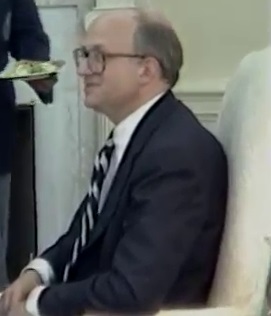
ENLARGE
|
The classic example of an unshiftable tax is the general tax
on pure rental income. Since Ricardo, economists have believed
that the annual net rental income of unimproved land falls by the
amount of the annual tax and its price by the capitalized value of
this tax. This paper shows that these conclusions are false, that
the tax on pure land rents is at least partly shifted, and that
the price of land may be increased by the imposition of a tax.
Implications are suggested for the analysis of the corporate
income tax and the taxation of natural resources.
[From: "The Surprising Incidence
of a Tax on Pure Rent: A New Answer to an Old Question," The
Journal of Political Economy, Vol. 85, No. 2 (Apr., 1977), pp.
349-360. Quoted in Land & Liberty, November 12, 1994]
|
Fels,
Joseph

ENLARGE
|
Joseph Fels devoted much of his share of profits from the Fels
Naptha Soup Co. to ending land monopoly. He sought to demonstrate
the validity of Henry George's analysis by establishing
experimental communities where all public revenue would come from
the rental value of land. Fels wrote:
The fundamental evil, the great God-denying crime of society,
is the iniquitous system under which men are permitted to put into
their pockets the community-made values of land, while organized
society confiscates for public purposes a part of the wealth
created by individuals.
[19--]
|
Fichte,
Johann G.
(1762-1814)

ENLARGE
|
Johann Gottlieb Fichte developed a systematic version of
transcendental idealism, which he called Wissenschaftslehre (or “Doctrine
of Scientific Knowledge”). He based his system upon the
concept of subjectivity. From 1794 to 1799 he taught at the
University of Jena, where he applied his philosophy to an
elaborate transcendental system that embraced the philosophy of
science, ethics, philosophy of law (i.e., of “right”)
and religion.
Only the products of his hands are therefore the absolute
property of the agriculturist. They belong to him substance and
all, whereas of the lands he has only an accidence.
[From: Science of Rights
(1889), Part II, Book 3, Sec. I (On Property in Land)]
|
Fitch,
Robert

ENLARGE
|
Best of all, a differential tax -- one that is higher on land
than on buildings -- does away with the usual disadvantage of
taxes. Almost invariably, if you tax something the capitalists
will produce less of it and charge you more for it. But land is
different. Most of it was produced once and for all by God. ...If
you tax cigarettes the price will go up; if you tax the land you
lower its price. It's no coincidence, then, that the one large
city in the country with such a tax, Pittsburgh, has the lowest
housing prices of any major city in America.
[From: the Nation, October 29,
1990]
|
Ford,
Henry
(1863-1947)

ENLARGE
|
Ford was quoted in Liberty magazine in an article by Donald
Wilheim, saying:
We ought to tax all idle land the way Henry George said -- tax
it heavily, so that its owners would have to make it productive.
|
Forrester,
Jay W.

ENLARGE
|
Jay W. Forrester is Germeshausen Professor Emeritus and Senior
Lecturer at the Sloan School of Management, Massachusetts
Institute of Technology. He began his career as an electrical
engineer working on servomechanisms and large-scale digital
computers. While Director of the MIT Digital Computer Laboratory
from 1946 to 1951, he was responsible for the design and
construction of Whirlwind I, one of the first high-speed digital
computers.
The tax on improvements rather than on land favors old
buildings whose aging is an ultimate part of the urban decline
process.
[Source of quote not known]
...the complex system is even more deceptive than merely
hiding causes. In the complex system, when we look for a cause
near in time and space to a symptom, we usually find what appears
to be a plausible cause. But it is usually not the cause. The
complex system presents apparent causes that are in fact
coincident symptoms. The high degree of time correlation between
variables in complex systems can lead us to make cause-and-effect
associations between variables that are simply moving together as
part of the total dynamic behavior of the system. Conditioned by
our training in simple systems, we apply the same intuition to
complex systems and are led into error. As a result we treat
symptoms, not causes. The outcome lies between ineffective and
detrimental.
[From: Urban Dynamics (1969),
Pegasus Communications, pp. 8-9]
|
Fortune
Magazine |
The editors of Fortune Magazine, August 8, 1983,
observed:
Higher land taxes, especially when accompanied by reduced
taxes on structures, look like an idea businessmen ought to
embrace and promote. The benefits in the form of more jobs and
increasingly compact development are not only lasting, but flow to
the whole community.
|
Fox,
Homer |
Land value taxation spurs development because a
landlord can hardly sit and hold vacant land. The tax forces the
rehabilitation of boarded-up buildings and the construction of new
ones on vacant land, thus creating jobs.
[Visiting professor, Wayne State
University, Detroit, MI, 1990]
|
Fox,
Matthew

ENLARGE
|
Matthew Fox is a theologian, educator and former Dominican
priest. He also the founder and president of the University of
Creation Spirituality and codirector of The Naropa Institute's
master's program in Creation Spirituality, both in Oakland,
California.
A land tax would tax all land but not improvements on the land
and in this way would encourage initiative and jobs, rather than
discourage them. It would run the land speculator and the absentee
landlord out of town.
A land tax would encourage farmers who actually farm instead of
those who speculate and it would increase productivity, ingenuity
and the creation of jobs. It would also lessen bureaucratic
interference since basically it is simplifying the law code.
[From: A Spirituality Named
Compassion: Uniting Mystical Awareness with Social Justice]

ENLARGE
|
Franklin,
Benjamin

ENLARGE
|
Our legislators are all landowners, and they are not yet
persuaded that all taxes are finally paid by the land ...
therefore, we have been forced into the mode of indirect taxes.
...All the property that is necessary to a man for the
conservation of the individual and the propagation of the species,
is his natural right which none may justly deprive him of; but all
property superfluous to such purposes is the property of the
public.
[source not identified]
|
Franklin,
Benjamin |
All the property that is necessary to a man for the
conservation of the individual and the propagation of the species,
is his natural right which none may justly deprive him of; but lal
property superflous to such purposes is the property of the
public.
[source not identified]
|
Franklin,
Benjamin |
But notwithstanding this increase (of population),
so vast is the territory of North America, that it will require
many ages to settle it fully; and, till it is fully settled, labor
will never be cheap here, where no man continues long a laborer
for others, but gets a plantation of his own; no man continues
long a journeyman to a trade, but goes among these new settlers,
and sets up for himself.
[From: Observations Concerning for
Increase of Mankind (1751), Sec. 8, Works, Vol. II, p.
225]
|
Frazier,
Douglas |
Frazier, U.S. leader of the United Auto Workers, told
the National Conference on Alternate State and Local Policies held
over the Independence Day celebration in 1979:
One day, we are going to ask ourselves, did anyone make the
oil and minerals and then put them in the ground? We will then
realize that they belong to all of us.
|
Freeman,
Edward A.
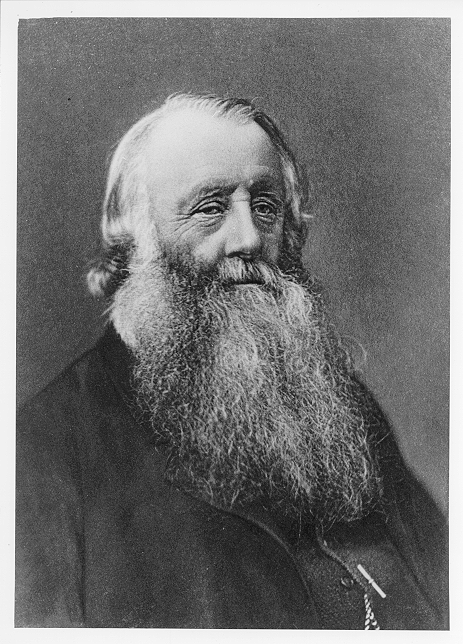
ENLARGE
|
And now the final stroke was put to a change which had been
gradually going on for some generations. The folkland, the common
land of the nation, was now changed, fully and forever, into terra
Regis, the land of the king.
[From: The Norman Conquest
(1867), Vol. IV, Chap. 17, p. 15]
|
Friedman,
Milton
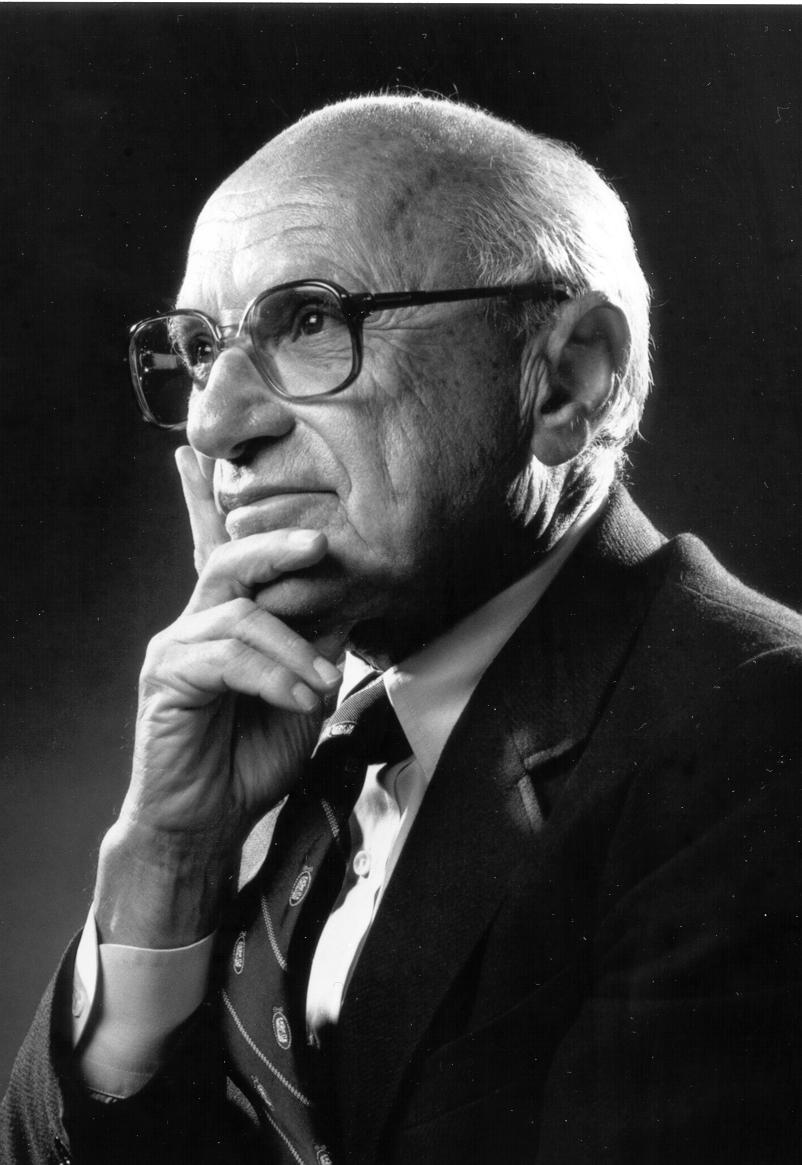
ENLARGE
|
Nobel Prize winning economist Milton Friedman
has written:
Land should be taxed as much as possible, and improvements as
little as possible.
In an interview in Human Events, November 18, 1979,
Milton Friedman said:
"There's a sense in which all taxes are antagonistic to
free enterprise -- and yet we need taxes. ...So the question is,
which are the least bad taxes? In my opinion the least bad tax is
the property tax on the unimproved value of land, the Henry George
argument of many, many years ago."
|
Friedman,
Milton |
The least bad tax is the property tax on the unimproved value
of the land, the Henry George argument of many years ago.
[Professor of Economics, University of
Chicago, in address to the Americanism Education League]
And, from a letter writen to William Newcomb (President, Media
Foundation for Land Economics) in 1979:
In Ricardo's words, the original and indestructible qualities
of the land d not by any means account for all of the current rent
from the land; land can be produced, its qualities can be
improved, all through investment for which there is no incentive
if the whole of the yield for improving the productivity of land
or from producing the land were to go to the government.
On the other side of the issue, there are many other resources,
of which human labor is one of the most important, which are, to
put it in technical economic jargon, in inelastic supply so that a
tax on the return from such services is unlikely to affect the
amount of such services made available for market use. The most
obvious are such items as the skill of a Muhammed Ali or of a
Frank Sinatra. These are natural resources too, and they are
limited in supply and derive their value from their scarcity.
I realize that in almost all other respects the views of the
Georgists and of my own are very much the same. I am more than
glad to join with them in common ojbectives, but I could not ally
myself with the Georgist movement in any sense which suggested
that I agreed with its fundamental underlying premises.
The following quote from Professor Friedman is also attributed to
correspondence with William Newcomb. However, this statement is
repeated here from secondary sources which do not indicate the
date of the letter or any additional comments:
I share your view that taxes would best be placed on the land,
and not on improvements.
|
Froude,
James A.

ENLARGE
|
To treat land, with the present privileges attached to the
possession of it, as an article of sale, to be passed from hand to
hand in the market like other commodities, is an arrangement not
likely to be permanent either in Ireland or elsewhere.
[From: Nineteenth Century,
September, 1880, p. 369]
|
Froude,
James A. |
Seeing that men are born into the world without their own
wills, and being in the world they must live upon the earth's
surface, or they cannot live at all, no individual or set of
individuals can hold over land that personal and irresponsible
right which is allowed them in things of less universal necessity.
[From: History of Ireland
(1872 and 1984), Book, I, Chap. 2, Sec. 6, p. 131]
|
Froude,
James A. |
Land is not, and cannot be, property in the sense
in which movable things are property. Every human being born into
this planet must live upon the land if he lives at all. He did not
ask to be born, and being born, room must be found for him. The
land in any country is really the property of the nation which
occupies it.
[From: Ireland, Nineteenth
Century (September, 1880), p. 362]
|
Fuller,
Buckminster

ENLARGE
|
He [Fuller] feels, as did George, that the truly effective
revolution would not lower the upper end of the socio-economic
spectrum as much as raise the bottom up.
[quote from a letter by Ann Mintz,
secretary to Buckminster Fuller, February 21, 1978]
|
Gaffney,
Mason
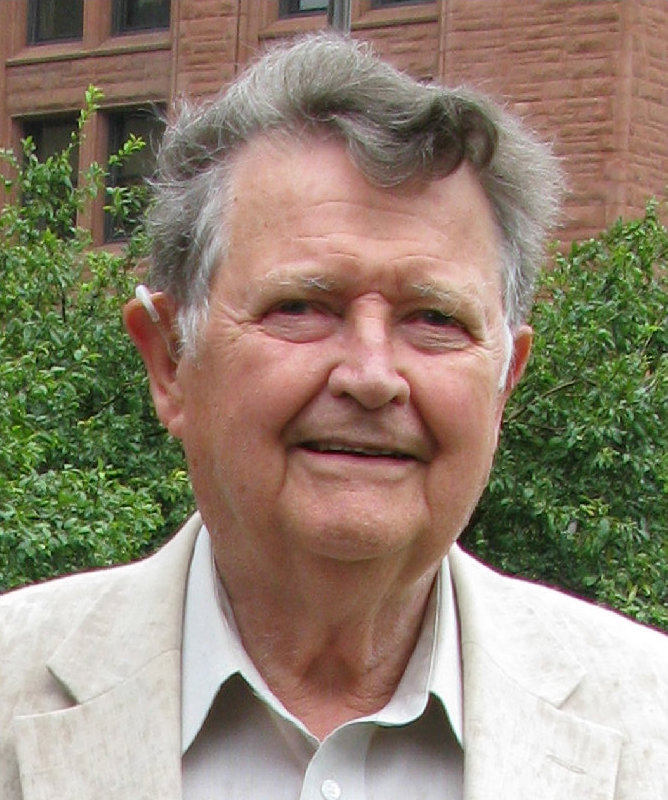
ENLARGE
|
George's blend of radicalism and conservatism can puzzle one,
until it is seen as a reconciliaton of the two. The system is
internally consistent, but defies conventional stereotypes.
[From: New Palgrave Dictionary of
Economic Thought, 1987]
|
Gaffney,
Mason |
The Neoclassical economists' view of their proper role is
rather like that in The Realtor's Oath, which includes a vow "To
protect the individual right of real estate ownership." The
word "individual" is construed broadly to include
corporations, estates, trusts, anonymous offshore funds, schools,
government agencies, institutions, partnerships, cooperatives,
Archbishops, families (including criminal families) and so on, but
"individual" sounds more all-American and subsumes them
all. This is a potent chant that stirs people to extremes of
self-righteousness and siege mentality when challenged.
[from: The Corruption of Economics,
1994]
|
Galbraith,
John Kenneth

ENLARGE
|
If a tax were imposed equal to the annual use value of real
property ex its improvement, so that it would now have no net
earnings and hence no capital value of its own -- progress would
be orderly and its fruits would be equitably shared.
[From the book, The Affluent
Society, p.44]
|
Gandhi,
Mahatma

ENLARGE
|
There is enough for everybody's need, but not enough for their
greed.
|
George,
David Lloyd
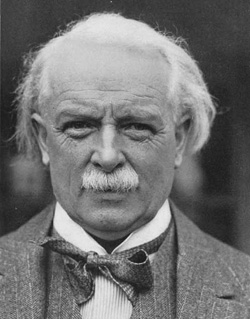
ENLARGE
|
The land question in the towns bears upon (over-crowding). It
is all very well to produce "Housing of Working Class"
bills. They will never be effective until you tackle the taxation
of land values.
[From: a speech not more specifically
identified]
|
George,
David Lloyd |
To prove a legal title to land one must trace it back to the
man who stole it.
|
George,
David Lloyd |
"The great criticism against rating is not merely that it
lacks uniformity and is unfair between the parties, but that it is
unfair to the class of property that you tax and rate. This is the
greatest grievance of all - that it taxes improvements. The more a
landlord improves his property the higher he is rated; the more he
neglects his property the less he is rated. …If he allows his
cottages to fall into decay and become empty, his rates are less;
but if he is a good, sound landlord, who repairs ruinous cottages
and builds new ones, up go his rates. The man who trusts to
obsolete machinery in his business can keep his rates low; but the
man who puts in new machinery and improves his buildings has to
pay a higher contribution to the rates."
[Mr. Lloyd George, in the House of
Commons, 28th April 1913]
"You cannot build houses without land; you cannot lay
down trams for the purpose of spreading the population over a
wider area without land. As long as the landlords allowed to
charge prohibitive prices for a bit of land, even land, without
contributing anything to local resources, so long will this
terrible congestion remain in our towns. That is the first great
trust to deal with, and for another reason --resources of local
taxation are almost exhausted. It is essential that you should get
some new resources for this purpose. What better resources can you
get than this wealth created by the community, and how better can
it be used than for the benefit of the community? ...It is all
very well to produce Housing of the Working Classes Bills. They
will never be effective until you tackle the taxation of
land-values."
[Mr. Lloyd George, at Newcastle,
4th March 1903]
"Who ordained that a few should have the land of Britain
as a perquisite; who made 10,000 people owners of the soil and the
rest of us trespassers in the land of our birth; who is it? Who is
responsible for the scheme of things whereby one man is engaged
through life in grinding labour, to win a bare and precarious
subsistence for himself . . . and another man who does not toil
receives every hour of the day, every hour of the night whilst he
slumbers, more than his poor neighbour receives in a whole year of
toil? Where did the table of the law come from? Whose finger
inscribed it?"
[Mr. Lloyd George, at Newcastle,
30th September 1909]
"Search out every problem, look into these questions
thoroughly, and the more thoroughly you look into them you will
find that the land is at the root of most of them. Housing, wages,
food, health, the development of a virile, independent, manly,
Imperial race - you must have a free land system as an essential
condition of these. To use a gardening phrase, our social and
economic condition is root-bound by the feudal system. It has no
room to develop, but its roots are breaking through. Well, let's
burst it!"
[Mr. Lloyd George, at Aberdeen,
29th November 1912]
"We want to do something to bring the land within the
grasp of the people. We want to put an end to the system whereby
the land of this country is retailed by the ounce, so that there
should not be an extra grain of breathing spaces. . . .The
resources of the land are frozen by the old feudal system. I am
looking forward to the spring-time, when the thaw will set in, and
when the people and the children of the people shall enter into
the inheritance that has been given them from on high."
[Mr. Lloyd George, at Liverpool,
21st December 1909]
|
George,
Henry
(1839-1897)
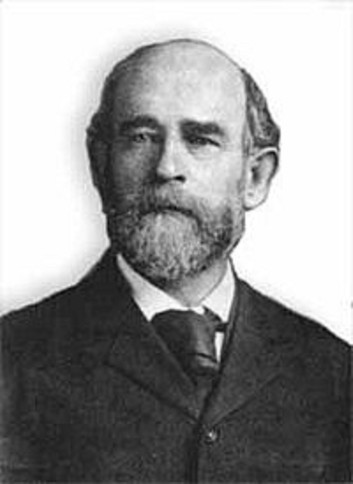
ENLARGE
|
More than any other figure during the late nineteenth century,
Henry George, author of the book Progress and Poverty,
dedicated his life to the cause of collecting the rental value of
land (sometimes referred to as ground rent or economic
rent) and the ending monopoly privilege associated with land
ownership. George told his readers:
What man has produced belongs to the individual producer; what
God has created belongs equally to all men ... therefore abolish
all taxation save on the value of land.
|
George,
Henry |
Here are two men of equal incomes -- that of the one derived
from the exertion of his labour, that of the other from the rent
of land. Is it just that they should equally contribute to the
expenses of the State? Evidently not. The income of the one
represents wealth he creates and adds to the general wealth of the
State; the income of the other represents merely wealth that he
takes from the general stock, returning nothing.
[From: Progress and Poverty
(1879)]
|
Getty,
John Paul |
Sadly, as many or more persons with strong scholarly or public
reputation could be found who argue against the idea that the
earth is the birthright of each of us, equally, and against the
proposal to achieve equality of opportunity by means of a reliance
on the rental value of locations for public revenue.
Many of the same persons would also disagree that moral
principles are integral to the treatment of the earth as a form of
property distinct from what we produce with our labor and what
capital goods we possess. From one of the original oil tycoons,
John Paul Getty, came some very dark humor, as Getty turned a
Biblical quotation attributed to Jesus Christ into the following:
"The meek shall Inherit the earth -- but not the mineral
rights."
|
Giffen,
Robert |
The soil of a nation is primarily the property of the whole
nation -- the common inheritance of all.
[From: Essays on Finance
(1871), First Series, Chap. X, p. 249]
|
Giffen,
Robert |
Land-owning is, beyond all other things, in the nature of a
monopoly.
[From: Essays on Finance
(1871), First Series, Chap. X, p. 239]
|
Giffen,
Robert |
It is certain, however, that a large part of the improvement
is due to the increasing value of advantageous sites, an unearned
increase of value such as Mr. Mill speaks of, and therefore a kind
of profit which the State may restrict with least harm.
[From: Essays on Finance
(1871), First Series, Chap. X, p. 244]
|
Gilder,
George
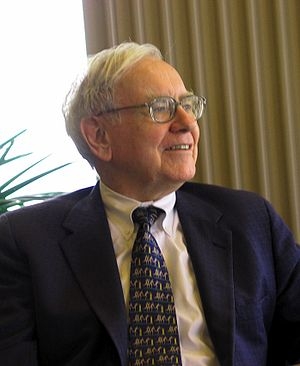
ENLARGE
|
As the late Henry George eloquently maintained in his classic "Progress
and Poverty," landowning in itself is not a productive
activity. Yet most of the tax benefits assigned to real estate in
recent years have been redeemed chiefly by inflationary capital
gains and condominium conversions.
[from a column published in the Wall
Street Journal, 29 May 1986]
|
Gladstone,
Mary |
Yesterday I began 'Progress and Poverty', supposed to be the
most upsetting, revolutionary book of the age. At present Maggie
and I both agree with it, and most brilliantly written it is -- we
had long discussions. He (W.E. Gladstone, her father) is reading
it too.
[Reprinted from: Mary Gladstone,
Diary and Letters, London, 17 August, 1883]
|
Gladstone,
Mary |
Finished 'Progress and Poverty' with feelings of deep
admiration -- felt desperately impressed, and he is ia Christian.
[Reprinted from: Mary Gladstone,
Diary and Letters, Hawarden, 30 August, 1883]
|
Gladstone,
William
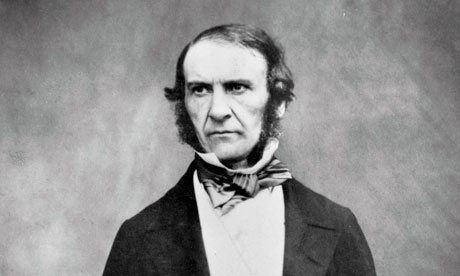
ENLARGE
|
I fully admit this; I have stated it long ago in Midlothian --
I hold it without the smallest doubt; if a time came when the
British nation could think that the land ought to be nationalized,
and that it were wise to do it, they have a perfect right to do it
beyond all doubt and question.
[From: A speech delivered at Hawarde,
23 September, 1889, reported in the Times, 24 September,
1889, p. 10, column 3]
|
Gladstone,
William |
Those persons who possess large portions of the space of the
earth are not altogether in the same position as possessors of
mere personalty, for personalty does not impose the same
limitations on the action and industry and the well-being to the
community in the same ratio as does the possession of land, and
therefore I hold that compulsory appropriation, if for an adequate
public object, is a thing in itself admirable, and even sound in
principle.
[From a speech delivered at West
Calder, 27 November, 1879. Reprinted in The Times, 28
November, 1879, p. 10, column 2]
|
Goddard,
Haynes C. |
There does exist a very appropriate financial mechanism for
compensation to property owners. it is the land value increment
tax, formerly known as a betterment tax. The idea is old, simple
and widely considered fair. An increase in land value, as opposed
to changes in the property value resulting from improvements
erected on land, is basically an increase in site value. The land
owners typically has done nothing to produce the incremental
value. this increase usually results from population growth,
economic growth and the infrastructural investments made by local
governments, such as roads, water supply and sewerage. These
increments are unearned by the property owner and could be taxed
away without affecting resource allocation. That is, such taxation
would not impair the potential for the land market to assign land
to its 'highest and best' use."
[Reprinted from the New York Times,
22 May 1995, a letter by Haynes C. Goddard, Professor of Economics
at the University of Cincinnati]
|
Godwin,
William

ENLARGE
|
Humanity weeps over the distreses of the peasantry of all
civilized nations; and when she turns from the spectacle to behold
the luxury of their lords, gross, imperial and prodigal, her
sensations are certainly not less acute. this spectacle is the
school in which mankind have been educated. they have been
accustomed to the sight of injustice, oppression and iniquity,
till their feelings have been made callous, and their
understanding incapable of apprehending the nature of true virtue.
[From: Political Justice
(1793), Book VIII, Chap. 2]
|
Godwin,
William
|
It is territorial monopoly that obliges men unwillingly to see
vast tracts of land lying waste or negligently and imperfectly
cultivated, while they are subjected to the miseries of want.
[From: Political Justice
(1793), Book VIII, Chap. 3]
|
Goethe,
Johann Wolfgang

ENLARGE
|
The great ones of the world have taken this earth of ours to
themselves; they live in the midst of splender and superfluity.
The smallest nook of the land is already a possession; none may
touch it or meddle with it.
[From: Wilhelm Meister]
|
Goldman,
E.F.
(historian) |
For some years prior to 1952, I was working on a history of
American reform and over and over again my research ran into this
fact: an enormous number of men and women, strikingly different
people, men and women who were to lead 20th century America in a
dozen fields of humane activity wrote or told someone that their
whole thinking had been redirected by reading Progress and Poverty
in their formative years. In this respect no other book came
anywhere near comparable influence and I would like to add this
word of tribute to a volume which magically catalyzed the best
yearnings of our fathers and grandfathers.
|
Gompers,
Samuel
(1850-1924)

ENLARGE
|
Gompers, a leader of the U.S. labor movement, declared:
I believe in the Single Tax. I count it a great privilege to
have been a friend of Henry George and to have been one of those
who helped to make him understood in New York and elsewhere...
|
Goodman,
George
(aka Adam Smith)

ENLARGE
|
Every improvement in the circumstances of the society tends,
either directly or indirectly, to raise the real rent of land, to
increase the real wealth of the landlord, his power of purchasing
the labours or the produce of the labour of other people.
[from: Good Government
magazine, October 1999, p.6]
|
Gossen,
Hermann Heinrich |
Hermann Gossen (1810-1859) never held an academic position and
resigned from a career in the Prussian Civil Service in order to
complete work on his book. "I believe," he wrote of it, "that
my discoveries enable me to point out to man with unfailing
certainty the path that he must follow in order to accomplish
completely the purpose of his life."
The state could acquire land advantageously because it would
be able to borrow the purchase money at low rates of interest. If
collective ownership of land were introduced, society instead of
private individuals would get the advantage of any future increase
in land values.
[from: Entwicklung der Gesetze der
menschlichen Verkehrs und der darausfliessenden Regeln fur
menschliches Handeln, Brunswick, 1854.]
|
Gracchus,
Tiberius
(B.C. 162-133)

ENLARGE
|
This Roman statesman complained:
The private soldiers fight and die to advance the wealth and
luxury of the great and they are called masters of the world,
while they have not a foot of ground in their possession.
[From: Plutarch's Life of Tiberius
Gracchus. Pliny the Elder (23-79), a Roman naturalist, added
that land monopoly ruined Rome.
|
Graham,
Franklin D. |
The real unearned income is that which accrues to an
individual without his having done anything which contributes to
production. Of the several types of such income the most important
is that which issues from the site value of land. the recipient of
such an income does nothing to earn it; he merely sits tight while
the growth of the community about the land to which he holds title
brings him unmerited gain. This gain is at the expense of all true
producers whether they be laborers, enterprisers or investors in
industrial equipment. The taxation of this gain can do nothing to
deprive the community of any service since the donee is rendering
none. The land will be there for the use of society whether the
return from it be taxed or free. Society creates the value and
should secure it by taxation.
[From: Henry George News,
February 1955. Franklin D. Graham was, at the time, a Professor of
Economics at Princeton University]
|
Greeley,
Horace
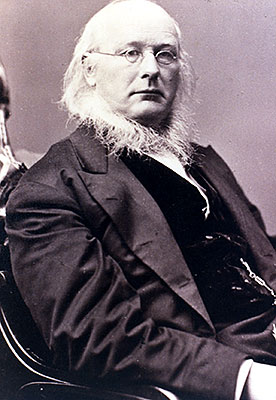
ENLARGE
|
Whenever the ownership of the soil is so engrossed by a small
part of the community that the far larger part are compelled to
pay whatever the few may see fit to exact for the privilege of
occupying and cultivating the Earth, there is something very much
like slavery.
[From: "Slavery at Home," in
Hints Toward Reform (1845), pp. 354-5]
We admit and insist on the legal right of the owner of wild
lands to keep them uninhabited forever, but we do not consider it
morally right that he should do so when land becomes scarce and
subsistence for the landless scanty and precarious. . . . yes, . .
. something will be done, in spite of any stupid clamor that can
be raised about 'Infidelity' and 'Agrarianism,' to secure future
generations against the faithful evils of Monopoly of Land by the
few.
[From: New York Weekly Tribune,
Aug. 4, 1845]
|
Greeley,
Horace |
In short, the terrestrial Man, possessing the well known
properties of matter, as well as the spirit, can only in truth
enjoy the rights of "Life, Liberty and the pursuit of
Happiness," by being guaranteed some place in which to enjoy
them.
[From: Land Reform, Hints Toward
Reform, (1850), p.312]
|
Greeley,
Horace
|
He who has no clear inherent right to live somewhere has no
right to live at all.
[From: Land Reform, Hints Toward
Reform, (1850), p. 312]
|
Greeley,
Horace
|
Man ... having a right to liberty, he must have consequently
the right to go somewhere on earth and do what is essential to his
continued existence, not by the purchased permission of some other
man, but by virtue of his manhood.
[From: Land Reform, Hints Toward
Reform, (1850), p. 312]
|
Griffin,
Walter B.
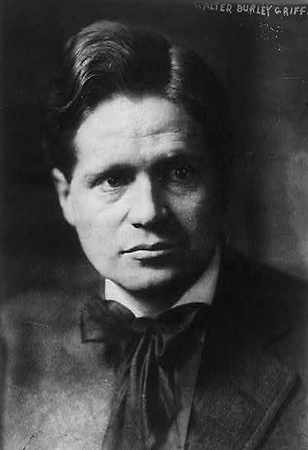
ENLARGE
|
Behind every radical movement you will find Single Taxers.
Woodrow Wilson is surrounded by them.
[Walter Griffin (1876-1937) was the
designer of Canberra, Australia, and member of the Chicago Single
Tax Club]
|
Grotius,
Hugo

ENLARGE
|
Vacant and uncultivated lands which are found in the territory
of a State should be awarded to foreigners if they demand them.
And in fact they have the right to seize them; for we should not
regard as property that which is not cultivated.
[From: Rights of War and Peace,
Book II, Chap. 2, Sec. 17]
|
Hapgood,
David |
A tax on the earnings of labor seems unjust by comparison
(with a land tax) because it deprives the individual of what is
rightfully his, the fruits of his own efforts. The same is true of
a tax on the return to capital, to the extent that capital
represents the unspent return of past labor and initiative.
Equally important -- and here orthodox economics agrees with
George -- a natural resources rental charge is the rare tax that
improves rather than distorts people's incentives. Tax labor, and
people work less. Tax savings, and savings diminish. But tax land,
and the supply remains the same, while the owner is forced to put
it to more productive use.
[From: New Republic (1986)]
|
Hall,
Peter |
When the site values are taxed ... the incentive is always to
develop so as to realise the gains that are being taxed. Indeed
this is one of the most important points which have consistently
been made by the advocates of site-value rating.
[From: Land Values: The
Report of the Proceedings of a Colloquium Held in London on March
13 and 14, 1965, under the Auspices of the Acton Society Trust]
|
Harris,
W. Carlton |
Land is of fundamental importance as the basis of man's
economic and socia life. Not only does mankind live upon it, but
it is the source of all material wealth. So self-evident is this
fact that its elaboration is unnecessary.
[From: "Real Estate and
Real Estate Problems," The Annals of the American Academy
of Political and Social Science, Part I, Vol. CXLVIII, No.
237, March, 1930, p.1.]
|
Harris,
W. Carlton |
The Ricardian doctrine of rent, namely, that rent is a
differential surplus largely, or in the whole, unearned, has led
to the promulgation of certain theories of land tax which usually
go under the name of the "single tax." In detail, these
plans vary all the way from proposals to tax the future unearned
ncome of land, to proposals to absorb the past unearned income,
which would practically amount to confiscation and would lead to
systems of land nationalization.
[From: "Real Estate and
Real Estate Problems," The Annals of the American Academy
of Political and Social Science, Part I, Vol. CXLVIII, No.
237, March, 1930, pp.5-6. ]
|
Harrison,
Fred

ENLARGE
|
The forces that shaped the modern state, and therefore the
character of the power that it exercises, were disputes over land
and its rent. The struggle over public value may be tracked at
several levels. One is cross-border conflict over territory.
...The outcome was the privatisation of rent..
[From: Ricardo's Law (2006),
p. 278]
|
Heilbrun,
James |
Site value -- the value of unimproved land -- has long been
regarded [by economists] as a particularly fit object for
taxation.
[Professor of Economics, Fordham
University; from his textbook, Urban Economics & Public
Policy, 1987]
|
Heinberg,
Richard |
Tax Reform is also essential. "Geonomics" tax
theorists, who trace their lineage to 19th century American
economist Henry George, argue that society should tax land and
other basic resources -- the birthright of all -- instead of
income from labor. Geonomic tax reform, says advocates, could
decrease wealth disparities while reducing pollution and
discouraging land speculation. Similarly, taxing nonrenewable
resources and pollution - instead of giving oil companies huge
subsidies in the form of 'depletion allowances" - would put
the breaks on resource extraction while giving society the means
with which to fund the development of renewables.
[From the book, The Party's Over,
p. 246]
|
Henderson,
Arthur
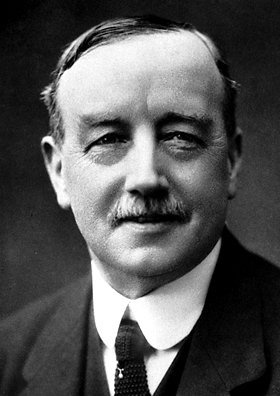
ENLARGE
|
In 1903, Arthur Henderson was elected Member of Parliament (MP)
following a by-election. In 1908, when Hardie resigned as Leader
of the Labour Party, Henderson was elected to replace him. In
1914, the then-Labour leader, Ramsay MacDonald resigned in protest
over the war, and Henderson returned. In 1915, following Prime
Minister Asquith's decision to create a coalition government, he
became the first member of the Labour Party to become a member of
the Cabinet, as President of the Board of Education. When David
Lloyd George became Prime Minister in 1916t, Henderson became a
member of the small War Cabinet. He resigned in August 1917 when
his idea for an international conference on the war was voted down
by the rest of the cabinet; shortly afterwards he resigned as
Labour leader.
Henderson lost his seat in 1918 but was returned to Parliament in
1919 after winning a by-election. He became Labour's chief whip,
only to lose his seat in the 1922 general election. Again, he
returned to Parliament via a by-election but lost this seat in the
1923 general election. Yet again he was returned to Parliament
months later after winning a by-election. He was appointed Home
Secretary in the first ever Labour government (led by MacDonald).
This government was defeated in 1924.
Henderson was re-elected in 1924 and was urged by others to
challenge Ramsay MacDonald for the party leadership. Worried about
factionalism in the Labour Party, he published a pamphlet called
Labour and the Nation, in which he attempted to clarify
the Labour's goals.
In 1929, Labour formed another minority government, and MacDonald
appointed Henderson as Foreign Secretary, a position Henderson
used to try to reduce the tensions that had been building up in
Europe since the end of the War. Diplomatic relations were
re-established with the USSR and the League of Nations was given
Britain's full support.
During the Great Depression, Henderson joined with others in the
Cabinet opposing cuts in unemployment benefits. He resigned in
protest. In 1931, MacDonald attempted to form an emergency
National Government to tackle the crisis. The Labour Party
repudiated this government, and the National Executive expelled
MacDonald and all other Labour members who supported him
(Henderson cast the only vote against this). Henderson now became
leader of the party. With the economic and political situation
still uncertain, the National Government decided to call a general
election, and in the largest landslide in British political
history, it won an overwhelming majority. Yet again Henderson lost
his seat. The following year he relinquished the party leadership.
Henderson returned to Parliament after winning yet another a
by-election and spent the rest of his life trying to halt the
gathering storm of war. He chaired the Geneva Disarmament
Conference and was awarded the Nobel Peace Prize in 1934. He died
aged 72 in 1935.
"The Labour Party says that if the great landowners of
this country desire to put fences round the most productive soil
in the world … they must pay for the pleasure of doing so.
Accordingly, it is proposed to have the land valued, and to ask
the owner to pay a tax on that valuation. I think that by the
pressure of the taxation and rating of land-values the owners
would soon find that the land held out of use was not so necessary
to their pleasure as they thought. I venture to suggest that they
would quickly commence to seek buyers or tenants. The plentiful
supply of land that would come on the market would enable farmers
to obtain their holdings at a reasonable price or rent instead of
having to enter into possession on the inflated values with which
you are acquainted. I assert, without fear of contradiction, that
nothing would give a greater stimulus to the agricultural
industry than the freeing of the land. More farms would be opened
up; more opportunities of employment would offer for the
agricultural worker; the countryside would become a hive of
industry instead of a grave of disappointed hopes. The root of the
rural problem is where all roots are to be found - in the Land."
[Mr. Arthur Henderson, at Cromer,
17th March 1922]
|
Henderson,
Arthur
|
"The taxation of land-values would not impose any further
burden upon the agricultural industry. . . .The landowner would
have to pay it. He could not pass it on to the farmer, and he
could not make the agricultural worker pay it by means of a
reduction in his standard of life. I challenge anyone to say that
a tax on economic rent is paid by anyone else than the receiver of
the rent. But the Labour Party would go further than that. The
present system of assessment and rating produces an inequality of
burdens which are injurious to agriculture. Improvements are
positively discouraged. The burden of rates is often heaviest
where it can least well be borne. A farmer who improves his land
or erects an additional building for the housing of his live stock
finds immediately that his assessment is raised. The Labour Party
holds that it is suicidal for the nation to penalise by increased
taxation occupiers of land who effect improvements which add to
its value. We propose a drastic revision of the entire system of
assessment and rating in order that the taxation of land may be
used to unrate the improvements made by the occupier. "
[Mr. Arthur Henderson, at Cromer,
17th March, 1922]
|
Henderson,
Arthur
|
"Under our present system improvements are penalized. If
a shopkeeper extends his premises, or a farmer increases the value
of his farm by erecting improved buildings or draining the land,
the rates are immediately increased. That is a tax on private
enterprise with which I do not agree. Private enterprise
of a character not subversive of the public good I would
encourage. It little becomes the wealthy landlords who oppose the
shifting of the burden of the rates from houses, factories, shops,
and machinery on to the value of the land, to criticise the speech
I made at Newport. Why f I recently attached my name to a Bill for
the taking of rates off machinery. Is that an attack on private
enterprise? "
[Mr. Arthur Henderson, at
Newcastle By-election, January 1923]
|
Henderson,
Arthur
|
"The principle and policy of the United Committee have
no more sincere supporter than myself. The taxation of land-values
has been a vital need ever since the private ownership of land
formed an integral part of the social system, but the aftermath of
a great war has brought us problems which have dragged its urgent
necessity more into the light and indicated the essential truths
of the doctrine taught by Henry George."
[Mr. Arthur Henderson, Letter to
the International Conference on the Taxation of Land-values at
Oxford, August 1923]
|
Henderson,
Arthur
|
"The taxation of land-values with, of course, the
exemption of improvements, does not receive my support merely as a
plan for raising additional revenue. It is designed to achieve far
greater results. It seeks to open the way to the natural resources
from which all wealth springs. The labour is here, and with it the
wilt to work, but the land still lies locked in the grip of a
tenacious and unrelenting monopoly, while unemployment and poverty
haunt us with a terrifying persistence."
[Mr. Arthur Henderson, ib.]
|
Hill,
Edward

ENLARGE
and
Nowak,
Jeremy

ENLARGE
|
The following excerpt is from an article appearing in the Brookings
Review, "Nothing to Lose: Only Radical Strategies Can Hep
America's Most Distressed Cities":
As a first step, cities should abolish all business taxes that
inhibit the location of startup firms or discourage investment in
productivity-enhancing equipment or practices... Cities should
also replace the business property tax with a tax on the market
value of land, coupling the land tax with a broader use of
business improvement districts or tax increment finance districts
to pay for major infrastructure investments. Land taxes ... have
several advantages over property taxes in keeping a city's economy
competitive. They discourage speculative land banking. They
encourage businesses to place as much capital on property as is
economically justifiable because non-land forms of real property
are not taxes. ...
Local personal taxes commonly take three forms: sales taxes, wage
or income taxes, and property taxes, the latter being the most
common. A residential property tax has two components -- a land
tax and a sax on the value of the structure. The land component of
the residential property tax should be assessed on an equal basis
with the business land tax, again providing incentives to develop
in neighborhoods with low land values, as well as preventing
speculative land banking.
[Edward Hill is a senior research
scholar at Cleveland State University's Levin College of Urban
Affairs. Jeremy Nowak is president of the Reinvestment Fund
located in Philadelphia.]
|
Hobson,
John A.
(1858-1940)
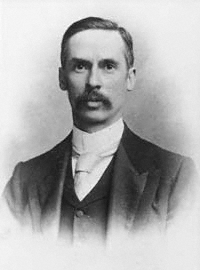
ENLARGE
|
During his long writing career, Hobson criticizing classical
economics, holding that economic theory was bound up with the
ethical problems of social welfare and should be a guide to
reform. He is frequently referred to as a precursor of John
Maynard Keynes. Hobson advocated partial socialization, and in
Imperialism (1902) he interpreted imperialism as a product
of the economic excesses of capitalism. His other works include
The Evolution of Modern Capitalism (1894), The
Economics of Distribution (1900), The Economics of
Unemployment (1922), and Confessions of an Economic
Heretic, (1938).
The part played by rent in the problems of poverty can
scarcely be overestimated.
[From: Problems of Poverty
(1891), p.10]
|
Holmes,
Rev. John Naynes
(1879-1964) |
The National Association for the Advancement of Colored People
(NAACP) was co-founded by Rev. Holmes, who wrote:
Progress and Poverty was the most closely knit, fascinating
and convincing specimen of argumentation that I believe, ever
sprang from the mind of man.
|
Holmes,
Rev. John Naynes |
My reading of Henry George's immortal masterpiece "Progress
and Poverty" marked an epoch in my life. All my thought upon
the social question and all my work for social reform began with
the reading of this book. The passing years have only added to my
conviction that Henry George is one of the greatest of all modern
statesmen and prophets. His eloquence, his character, his life
must ever remain among the imperishable treasures of the race.
|
Howe,
Frederic C.
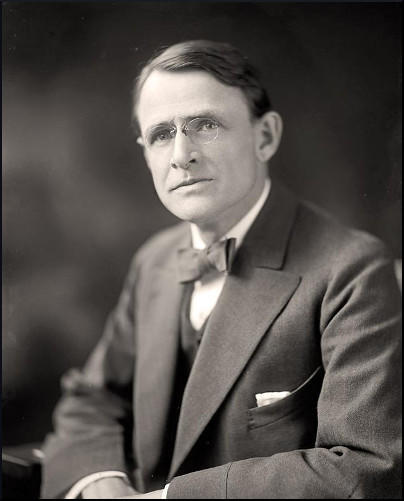
ENLARGE
|
While United States Commissioner of Immigration, in a
speech before the Pittsburgh Commercial Club, March 15, 1916:
Pittsburgh has set the pace for all America in her tax system
-- reducing taxes on improvements and increasing taxes on land
values -- the greatest single step any American city has taken in
city building.
|
Howe,
Frederic C.
|
The rich men I knew were not thrifty; they asked others to be
thrifty for them. They did not save; others saved for them. They
admonished others to virtues of meekness, humility, and duty, but
they observed none of their own admonitions.
They got an underhold on society, got it through monopoly and
made other people work for them. They capitalized something that
every one had to have or controlled a service that every one had
to use. They got rich easily, often quickly, and kept the wealth
they had acquired. ...Many men who got rich out of land had done
so against their will, or by accident.
[From: The Confessions of a
Reformer (1925), pp.222-223]
|
Howells,
William Dean
(1837-1920)
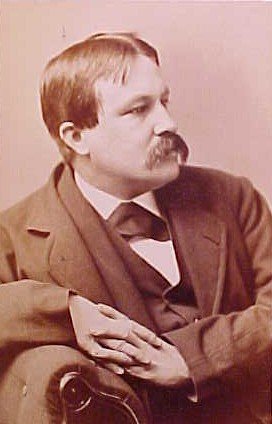
ENLARGE
|
Howells novel details the attempt to establish a new magazine in
New York City during America's Gilded Age. Historian Arthur
Schlesinger, Jr. described this work as "the first memorable
novel about New York City." Among the subjects explored are
the New York streetcar riot of 1889 and the execution of the
Haymarket anarchists in Chicago.
Some spaces, probably held by the owners for that rise in
value which the industry of others providentially gives to the
land of the wise and good, it left vacant comparatively far down
the road, and built up others at remoter points.
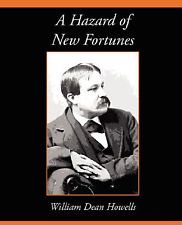
ENLARGE
[From: A Hazard of New Fortunes,
Part IV, Chap. 3]
|
Hughes,
Thomas |
The first thing which the democracy will write
upon the slate will be the nationalization of the land.
[From: An address at the Church
Congress of 1888]
|
Hugo,
Victor
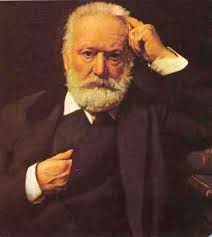
ENLARGE
|
Democratize property, not by abolishing, but by universalizing
it, so that every citizen without exception may be a landowner, an
easier task than it may be supposed; in short, know how to produce
wealth andhow to distribute it, and you will possess at once
material greatness and moral greatness, and you will be worthy to
be called France.
[From: Les Miserables, Saint
Denis, Book I., Chap. 4]
|
Hume,
David
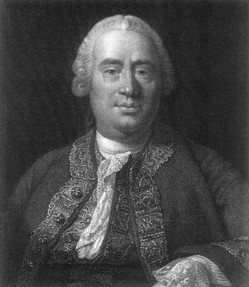
ENLARGE
|
The possession alone, and first possession, is supposed to
convey property, when nobody else has any preceding claim and
pretension. Many of the reasonings of lawyers are of this
analogical nature, and depend on very slight connections of the
imagination.
[From: Enquiry Concerning the
Principles of Morals, Sec. III, Part 2, Essays, Vol.
II, p. 190]
|
Hseng,
Hsiao |
Tseng Hsiao was at the time of the following statement
in 1989 Director of the China Research Institute of Land
Economics.
The principle of equitable distribution of land rights
requires no taxation on labour and capital. Furthermore, site rent
has to be taxed for public revenue because land has monopoly
power. There is a difference between ordinary products and land.
The latter is a gift of nature, which is limited and cannot be
increased by human beings; its revenue has to be shared among all
citizens in society.
[The source of the statement is not
known. It is reprinted from Land & Liberty,
July-August 1989]
|
Huxley,
Aldous
(1894-1963)

ENLARGE
|
In the preface to his Brave New World (p. viii), Huxley
wrote:
If I were now to rewrite the book, I would offer a third
alternative ... the possibility of sanity ... Economics would be
decentralist and Henry Georgian.
|
Hydeman,
Albert (Jr.) |
Is there a sensible alternative to the property tax? Such an
alternative would have to do the following things: Realign the tax
burden from those least able to pay to those most able to pay,
simplify and reduce the cost of community growth and development.
I think there is such an alternative. It's known as the land
value tax. We are now taxing improvements -- buildings -- at the
same rate we tax land. I think that's a mistake.
We're discouraging people from fixing up their properties. There
should be a lower property tax on improvements -- or none at all.
[former Secretary, Pa. Department of
Community Affairs]
|
BROWSE BY AUTHOR
|

























